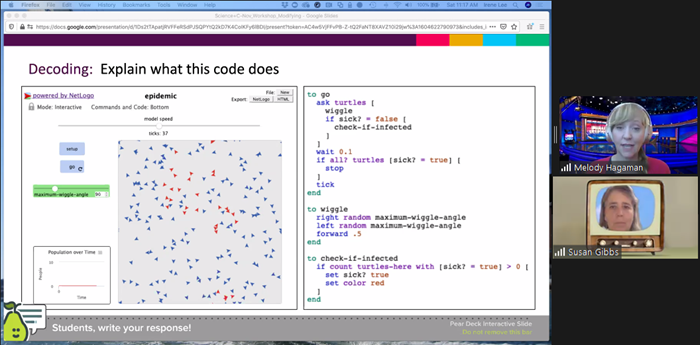Science+C Pilot Teachers Learn and Share during Day of Professional Development
On Saturday, November 7, 2020, seventeen Science+C pilot teachers gathered online for six hours of professional development (PD) to introduce computer modeling into high school science classes. The participants learned strategies, shared their experiences teaching Science+C units, and enjoyed being together in this valuable work.
A main focus of the PD was exploring code within NetLogo computer models of scientific phenomena, and then considering questions such as: “What does the code do?”, “What could it do—what questions could it answer?”“How could you (or your students) modify the code to reinforce the biology, chemistry, or physics concepts being taught?” “Finally, after modifying the code, assessing: “What is the impact of the change you made?”
Having already participated in three other PD sessions, NetLogo commands such as “set my angle” (informally, “wiggle”), “slider,” and “pcolor,” were now familiar to the teachers. What was especially exciting this time was hearing that their students were being introduced to the code and terms as well! Presenters shared tips and resources for engaging students and for scaffolding instruction. These included Pear Deck, Google Drawings, Digital Notebooks, IdeaBoardz, Mystery Model slides, customizable presentation templates, and more. Lively discussions ensued on how these materials could be—or are already being—used.

Seven of the pilot teachers presented their experiences introducing Science+C units in their own classrooms. Because most of the teachers are now teaching in fully remote environments, they found the session valuable for sharing successes and concerns, and for strategizing together.
While they acknowledged challenges, however, they also embraced their roles as pilot teachers of the new curriculum and were excited to be part of the Science+C program development. Comments included:
“I was so nervous, with remote learning, but it was just the opposite. I even had a couple of students ask me about a career in programming!”
Students were very apprehensive initially about accessing the code and making modifications. After the initial teaching and assigning the work, I could see who could do it independently and who was stuck. When we met individually online, they got it! To see that they could navigate through the assignment and get it was a success, especially those students who have struggled historically.
“I love Science+C and I’m super excited to implement it in my classroom.”
“This is the highlight of my year!”
Input from our pilot teachers, who are based in Massachusetts and New Mexico, is key to our development of the curriculum materials. Although the Science+C rollout and related research study will initially focus on Massachusetts high school science teachers, developing for both states will help the program scale to other states as well.
Meet our full project team, including our teachers, facilitators, researchers, and designers, here.
Apply now to express interest in bringing Science+C courses into your own school and to help determine their impact on student learning.